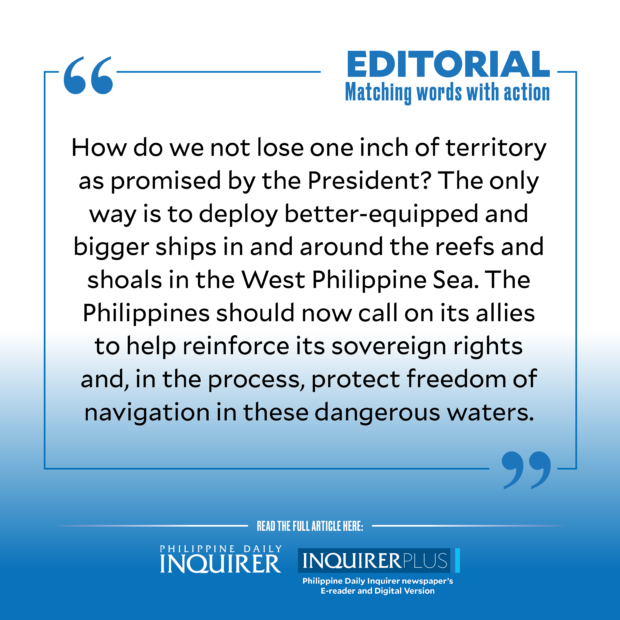Matching words with action
 With the China Coast Guard’s (CCG) latest water cannon attack on a Philippine Coast Guard (PCG) vessel in the West Philippine Sea, President Marcos should see through his vow to ensure that the country will not yield one inch of its territory to another country.
With the China Coast Guard’s (CCG) latest water cannon attack on a Philippine Coast Guard (PCG) vessel in the West Philippine Sea, President Marcos should see through his vow to ensure that the country will not yield one inch of its territory to another country.
“I will not preside over any process that will abandon even a square inch of territory of the Republic of the Philippines to any foreign power,’’ Mr. Marcos said in his first State of the Nation Address in July 2022, a promise he reiterated in a speech at the Philippine Military Academy in February this year.
These ringing words have been challenged on at least three occasions under Mr. Marcos’ first year in office. Early last month, the PCG reported that CCG ships had made dangerous maneuvers to block a PCG resupply mission in Ayungin Shoal, a submerged reef 194 kilometers off Palawan where the Philippine Navy maintains an outpost on the grounded ship, BRP Sierra Madre.
On Feb. 6, a CCG ship trained military-grade laser lights on a PCG vessel on its way to conduct another resupply mission, causing temporary blindness on its crew.
Then last Saturday, a CCG ship fired water cannons on a PCG vessel and a Philippine Navy supply boat on a routine troop rotation and resupply mission in the same area that is well within the Philippine exclusive economic zone (EEZ). It is by far the most aggressive act by China, plain for all to see through images taken by diplomatic sources.
The PCG and the Armed Forces of the Philippines have strongly condemned the unprovoked action by China. The Department of Foreign Affairs (DFA) should have, by now, filed the requisite diplomatic protest. The President, at the very least, should summon China’s ambassador to the Philippines to rebuke in the strongest terms China’s aggressive and bullying actions against its neighbor.
Mr. Marcos can draw strength from the unequivocal support of its Western allies, led by the United States, Australia, Japan, Canada, the United Kingdom, and the European Union, which have all condemned China’s “dangerous and provocative actions.” In separate statements, these countries called on China to respect the 2016 arbitral ruling of the Permanent Court of Arbitration which voided Beijing’s sweeping claims, and upheld the Philippines’ territorial claims in accordance with the United Nations Convention on the Law of the Sea (Unclos) that governs maritime and EEZ boundaries.
By now, it should be clear to the Marcos administration that mere diplomatic protests will not deter China from its war-like stance. The water cannon attack came just days after the Philippine Senate, in a rare act, passed a resolution calling on the government to intensify its efforts in “asserting and securing” the country’s sovereignty in the face of China’s illegal incursions in the West Philippine Sea. It also came barely two weeks after former president Rodrigo Duterte met with Chinese President Xi Jinping in Beijing, an unofficial meeting made known to Mr. Marcos only after the fact, and with no details divulged to the public. (If Mr. Marcos wants his administration to speak with one voice, he should not allow Duterte to undermine his authority and policy by making questionable trips to meet with Xi.)
In light of the latest water cannon incident, the DFA must conduct a more aggressive diplomatic offensive to shore up support from international groups and the United Nations to uphold the spirit of Unclos and the arbitral ruling. The silence from the Association of Southeast Asian Nations on China’s aggression is unfortunate but expected, but the Philippines should enlist support from other South China Sea claimant countries.
The task of the Marcos administration is to ensure that China will not be able to seize any more territory within our EEZ after the bitter lessons left by the Philippines losing control of Mischief Reef in 1995, and Scarborough Shoal in 2012 after a standoff with China. China’s latest move to prevent PCG and Philippine Navy boats from entering Ayungin Shoal through dangerous maneuvers, laser lights, and water cannons is part of a deliberate operation by Beijing to seize reefs and install military installations on them, therefore exercising de facto ownership on features within the Philippine EEZ.
How do we not lose one inch of territory as promised by the President? The only way is to deploy better-equipped and bigger ships in and around the reefs and shoals in the West Philippine Sea. The Philippines should now call on its allies to help reinforce its sovereign rights and, in the process, protect freedom of navigation in these dangerous waters. The planned joint patrols with the US in the West Philippine Sea should be pursued and even widened to include other countries with a stake in peace and order in the region.
Verbal support from our more powerful allies like the US, Japan, Australia, the UK, and the EU is important. But words have no meaning for China, as demonstrated by decades of duplicitous relations with the Philippines. It is now time to match these words with concrete action.




















